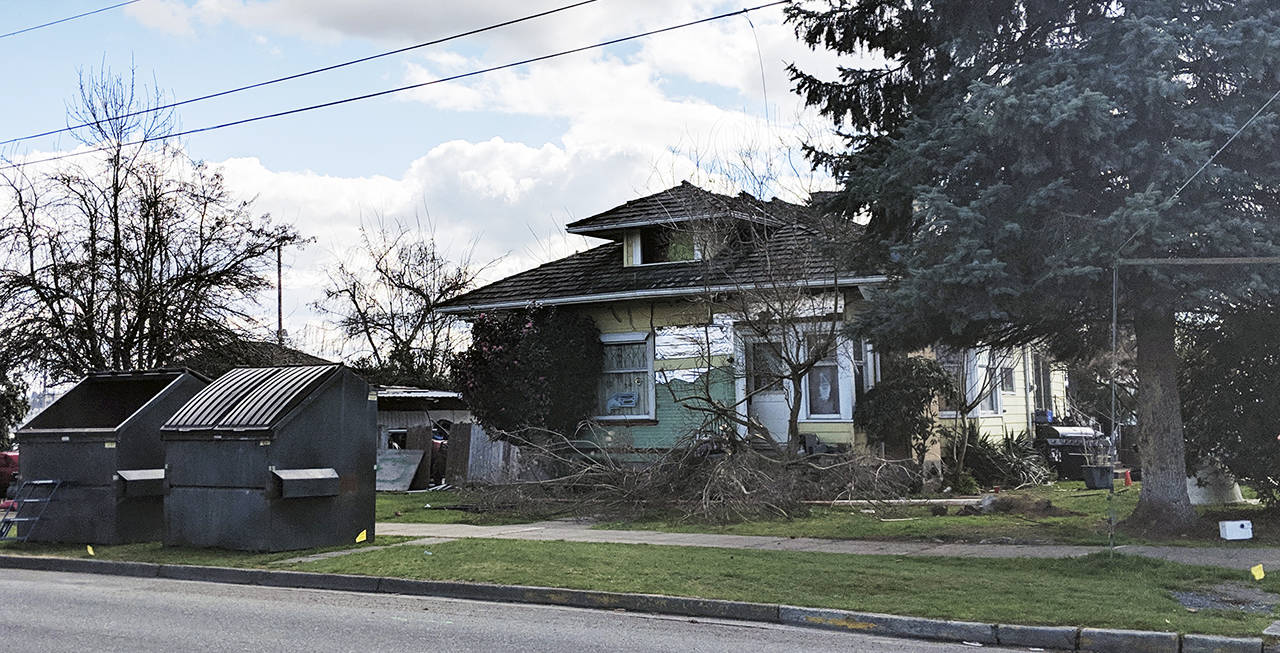MARYSVILLE — Soon, the last house standing in the way of the $12 million First Street bypass project in Marysville will fall.
The two-lane road from State to 47th avenues will be expanded into a bypass of up to five lanes. The project, which will handle traffic from a new $50 million interchange at I-5 and Highway 529, will relieve congestion and offer a new gateway into town.
The city spent three years in negotiations and legal proceedings to obtain the yellow, century-old home. Ultimately, eminent domain was used to acquire it, Marysville spokeswoman Connie Mennie said. The city bought nearly a dozen other houses, which were demolished by the end of last year.
Mennie called it a difficult process. The owner of the property is a 92-year-old woman with dementia who had lived there since the 60s. She often deferred decision-making to her daughter, who had been living with her, according to court documents.
But her children did not appear to have her best interests in mind, according to social worker reports filed in Snohomish County Superior Court. Documents allege she was “financially exploited, personally exploited, neglected and mentally abused.”
No one has been charged with any crimes in connection with the woman’s care.
When Adult Protective Services visited the home in December, she was in her bedroom. It was dark, and there was an “overwhelming odor” of cat urine and human feces. The kitchen was cluttered, the dishes were unwashed and there was little food.
The woman remarked on how she often saw people she didn’t know. Her home was apparently used as a place to use and sell drugs, such as methamphetamine and heroin, documents allege. In the past five years, police have cited three people at the house over 20 times for violating city code. Those fines, mostly related to the open storage of trash, totaled $14,500.
Each month, after the older woman received her Social Security check, her bank account would suddenly drop to tens of dollars, social workers wrote. Bank statements indicate that her debit card, which she reportedly didn’t have access to, had been used at the casino. She was $1,500 behind on utility bills.
The woman “did not appear to have a clear grasp on her current status, current events or orientation to date and place,” the report said.
Later, a doctor diagnosed her with severe dementia and stated that she was not capable of performing the basic functions of daily life.
The city had made an offer previously to provide free housing and health care for the woman as part of the purchase. The property would be paid off and the owner would get an additional $50,000, as well as money for moving expenses.
The woman’s daughter reportedly rejected the proposal, even though she didn’t have power of attorney.
The family did eventually accept an agreement, but by that point, the city chose not to act on it, Mennie said, because of concerns for the owner.
In March 2018, the city went to court to acquire the property through eminent domain. The sale, for $277,500, was completed Feb. 20.
The same day, the owner was placed into a care facility.
Her daughter said Wednesday she wasn’t sure where she would go. She also disputed how living conditions inside the home were described.
The remaining residents can still get cash assistance for moving costs if they move out by the end of the month, Mennie said.
“The city’s sympathetic that this is a really hard situation for the family,” she said.
The house could be demolished within weeks. Construction on the bypass is expected to start in June.
Zachariah Bryan: 425-339-3431; zbryan@heraldnet.com. Twitter: @zachariahtb.
Talk to us
> Give us your news tips.
> Send us a letter to the editor.
> More Herald contact information.

























